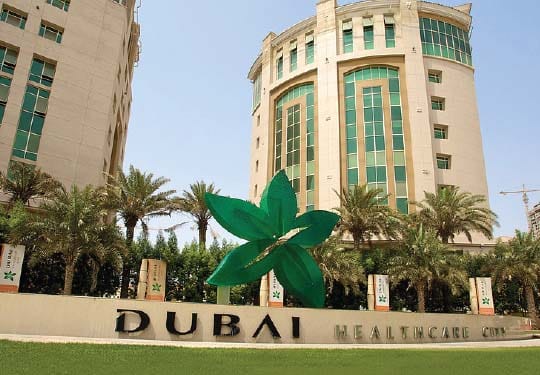
Dubai Healthcare
Introduction
Having been in Dubai for nearly 20 years I have seen the tremendous growth in the healthcare industry with an explosion of choice, a much tougher and more professional regulatory regime, and a rapid increase in health tourism. Dubai has become a destination of choice for many people in Europe, Africa, Asia and the Middle East for their healthcare needs.
Dubai, recognized globally for its rapid development and strategic positioning, has made substantial strides in the realm of healthcare. The Emirate’s healthcare infrastructure combines cutting-edge facilities with globally recognized best practices, addressing the needs of its cosmopolitan population and sizable expatriate community.

This article delves into the sophisticated healthcare ecosystem of Dubai, highlighting its dedication to excellence, technological advancement, and a patient-focused approach, solidifying its position as a leading healthcare destination within the Middle East.
This article does not constitute any sort of medical advice. Please check the useful links section and visit the relevant government websites for the most up to date information.
The Healthcare System in Dubai: A Two-Tiered Approach
The healthcare system in Dubai boasts a unique structure, offering a two-tiered approach to its diverse population:
Public Healthcare
- Free for Emirati nationals: Residents holding UAE citizenship receive subsidized or even completely free healthcare through public hospitals and clinics managed by the Dubai Health Authority (DHA). This covers emergency care, primary care consultations, specialist visits, diagnostic tests, and many treatments.
- Limited access for expats: Expatriates living in Dubai can access public healthcare, but at significantly higher costs than Emiratis. They require a health card and will encounter co-payments for services.
Private Healthcare:
- Mandatory for expats: Private health insurance is mandatory for all expats in Dubai. Employers typically offer coverage as part of their employment packages, or individuals can purchase plans independently.
- High-quality facilities: Dubai boasts numerous world-class private hospitals and clinics, equipped with advanced technology and staffed by international healthcare professionals.
- Wide range of services: Private healthcare caters to all medical needs, offering specialized treatments, advanced surgeries, and comprehensive wellness programs.
Key Features of the System Including Regulation
- Unified Insurance System: “Enaya” simplifies coverage for insured individuals, allowing them to access healthcare seamlessly across various private providers.
- Dubai Healthcare City: Established as a dedicated free zone, this hub attracts leading medical institutions and facilitates business growth in the healthcare sector.
- Focus on innovation: Dubai actively invests in medical research and technology, aiming to provide cutting-edge care and treatment options.
Considerations for Expats:
- Choose the right health insurance plan to ensure adequate coverage for your needs.
- Familiarize yourself with the network of covered healthcare providers.
- Understand co-payment amounts and any limitations in your plan.
Overall, the healthcare system in Dubai offers a high standard of care for both Emiratis and expats. While the two-tiered structure creates some inequity, the mandatory private insurance for expats guarantees access to quality healthcare services. Dubai’s commitment to innovation and its world-class facilities solidify its position as a leading player in the global healthcare landscape.
Healthcare regulation in Dubai is a multi-layered system involving several entities at both the federal and Emirate level:
Federal Level:
- Ministry of Health and Prevention (MoHAP): Sets national health policies, standards, and guidelines. Develops strategies for disease prevention, healthcare accessibility, and emergency preparedness.
- Health Insurance Regulatory Authority (HIRA): Oversees the health insurance market, ensures compliance with regulations, and protects consumer interests.
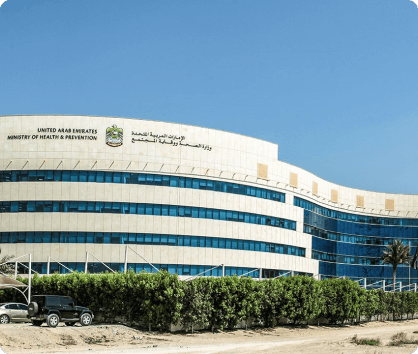
Emirate Level (Dubai):
- Dubai Health Authority (DHA): The primary regulatory body for the healthcare sector in Dubai. Licenses healthcare facilities and professionals, ensures quality standards, and monitors service delivery.
- Dubai Health Licensing System (HLS): A department within the DHA responsible for issuing licenses, managing healthcare practitioners’ registrations, and enforcing regulations.
- Health Regulation Sector (HRS): Another DHA department overseeing healthcare facilities and professionals, including those in free zones. Implements and manages key projects like the Dubai Health Inspection System (DHIS).
- Dubai Health Insurance Corporation (DHIC): Manages the unified government health insurance system “Enaya”, sets tariffs for healthcare services covered by the scheme, and monitors insurance provider compliance.
The relationship between the DHA and the MoHAP in the UAE is one of collaboration and coordination within the broader healthcare governance structure of the country.
Here are some key aspects of their relationship:
Jurisdiction and Authority:
- MoHAP: The Ministry of Health and Prevention is responsible for the oversight of the healthcare sector at the federal level across the UAE. It formulates national health policies, sets standards, and regulates healthcare services and facilities.
- DHA: The Dubai Health Authority is the regulatory body responsible for overseeing the healthcare sector in the Emirate of Dubai. It develops and implements healthcare strategies, regulates healthcare providers, and ensures the provision of high-quality healthcare services in Dubai.
Collaboration and Coordination: While MoHAP and DHA operate at different levels of governance (federal and emirate), they work collaboratively to ensure alignment in healthcare policies, standards, and initiatives. There is a need for coordination to avoid duplication of efforts and to promote consistency in healthcare regulations and services across the UAE.
Standardization and Guidelines: MoHAP often sets the overall healthcare standards and guidelines at the federal level, while DHA may develop specific regulations and guidelines tailored to the healthcare needs and priorities of Dubai. However, these standards and guidelines are typically aligned to ensure uniformity and quality of care across the country.
Healthcare Initiatives and Programs: Both MoHAP and DHA launch various healthcare initiatives, programs, and campaigns to promote public health, prevent diseases, and improve healthcare services. They may collaborate on national initiatives while also implementing emirate-specific programs based on local needs.
Communication and Information Sharing: There is a continuous exchange of information, data, and expertise between MoHAP and DHA to facilitate evidence-based decision-making, monitor healthcare indicators, and address emerging health challenges effectively.
In summary, the relationship between the DHA and MoHAP is characterized by collaboration, coordination, and alignment to ensure the delivery of high-quality healthcare services and the advancement of the healthcare sector across the UAE.
Additional Layers:
- Free Zones: Certain free zones (like Dubai Healthcare City) have their own healthcare regulations tailored to their specific needs and objectives.
- International Standards: Dubai seeks to align its healthcare regulations with international best practices set by organizations like the World Health Organization (WHO).
In summary, a complex network of institutions, each with specific responsibilities, ensures adherence to healthcare regulations in Dubai. The DHA plays a central role as the main regulatory body for the Emirate, while MoHAP and other federal entities provide overarching frameworks and oversight.
Dubai boasts a diverse and impressive healthcare landscape, catering to the needs of both Emiratis and expats. Here’s a glimpse into the two main tiers of healthcare facilities:
Public Hospitals and Clinics:
- Managed by the Dubai Health Authority (DHA): These facilities offer subsidized or free healthcare to Emirati citizens, covering primary care, specialist consultations, diagnostics, and many treatments.
- Modern and well-equipped: Public hospitals in Dubai are known for their advanced technology and experienced medical staff. Some notable examples include Rashid Hospital, Dubai Hospital, and Al Maktoum Hospital.
- Limited access for expats: Expats can access public healthcare, but at significantly higher costs than Emiratis and with some service limitations.
Private Hospitals and Clinics:
- World-class facilities: Dubai is home to numerous private hospitals and clinics that rival top healthcare institutions globally. These facilities boast cutting-edge technology, luxurious amenities, and international medical expertise.
- Specialization and innovation: Private healthcare providers cater to a wide range of specialties, including cardiology, oncology, orthopedics, and cosmetic surgery. Many invest heavily in research and technology, offering access to the latest treatment options.
- Popular choices: Some of the most renowned private hospitals in Dubai include:
| Hospital | Specialty |
| American Hospital Dubai | Women’s Health, Urology, Gastroenterology |
| Mediclinic City Hospital | Oncology, Pediatrics, Cardiac Surgery |
| Kings College Hospital Dubai | Cardiology, Orthopedics, Oncology, Neurology |
| Saudi German Hospital | Plastic Surgery, Dermatology, Ophthalmology |
| NMC Specialty Hospital | Oncology, Rheumatology, Pulmonology |
Selected hospitals in Dubai
Please note there are many other great hospitals in Dubai and the details in this list are just for guidance. Please for your own research and check with the Dubai Health Authority is you have any questions about a medical provider or individual. They are there to help.
Beyond Hospitals:
- Specialized clinics: Dubai offers a vast array of specialized clinics catering to specific needs, such as dental care, women’s health, children’s health, and mental health.
- Free health screenings: The DHA regularly organizes free health screening campaigns for various diseases, ensuring preventive care accessibility.
Overall, the healthcare system in Dubai provides a high standard of care with diverse options to cater to various needs and budgets. The public system guarantees basic healthcare for Emiratis, while the private sector offers world-class facilities and cutting-edge treatment options for all residents and visitors.
Remember, choosing the right healthcare provider depends on your specific needs and insurance coverage. Researching hospitals and clinics based on your medical condition, budget, and desired location is crucial.
Dubai Healthcare City (DHCC)
Dubai Healthcare City (DHCC) is a designated zone in Dubai dedicated to healthcare services and education. Located centrally, DHCC hosts various medical facilities, including hospitals, clinics, and research centers. The area encourages collaboration among healthcare professionals and researchers, aiming to enhance medical standards and knowledge sharing. By focusing on both clinical care and academic pursuits, DHCC aims to play a pivotal role in advancing healthcare standards within the region.
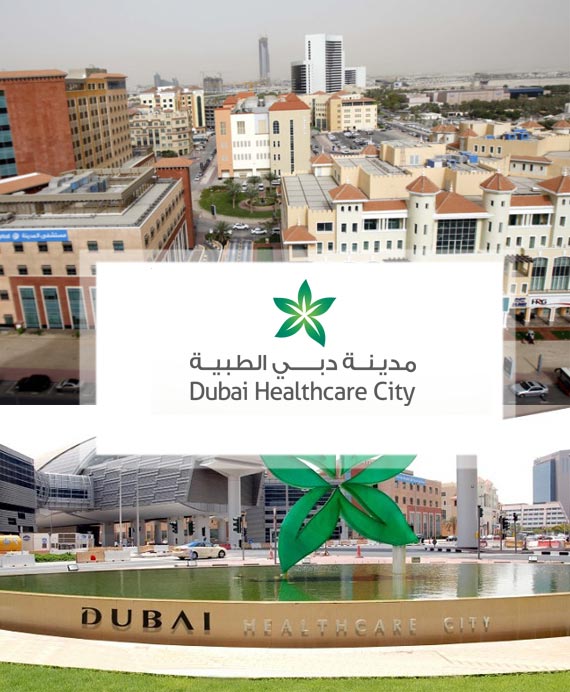
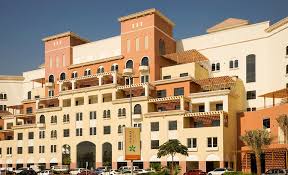
Medical Record Number (MRN)
The Medical Record Number (MRN) serves as a unique identifier for patients within the healthcare system in Dubai, ensuring accurate and organized documentation of medical records. This number is integral to the functioning of hospitals, clinics, and other healthcare facilities, as it allows for efficient retrieval and management of a patient’s health information.
In Dubai, as with many modern healthcare systems globally, the MRN system aids in streamlining patient care processes, from scheduling appointments and tracking medical histories to facilitating communication among healthcare providers. This standardized approach not only enhances the quality and continuity of care but also reinforces patient confidentiality and data security measures.
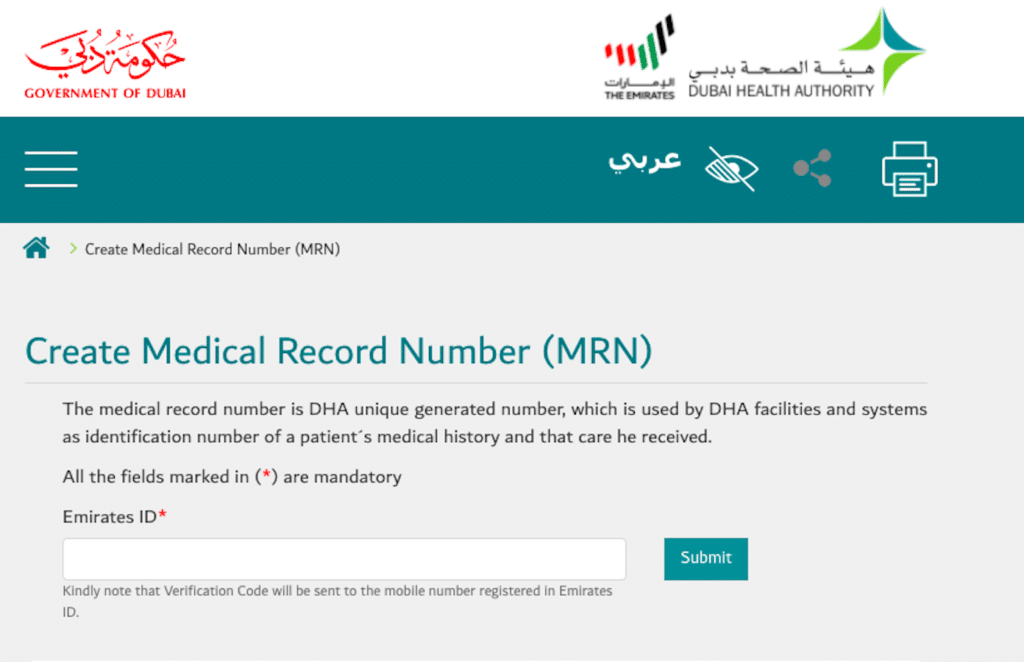
As Dubai continues to advance its healthcare infrastructure and digital capabilities, the role of the Medical Record Number remains paramount in promoting efficient, patient-centered healthcare delivery across the Emirate.
The Beauty Industry of Dubai: Luxury, Innovation, and Global Trends
Dubai’s beauty industry is a booming market, mirroring the city’s reputation for extravagance and trendsetting. It’s a fascinating blend of luxury, innovation, and global influences, catering to a diverse clientele with a penchant for looking and feeling their best. Here’s a glimpse into its key aspects:
Market Growth and Trends:
- Rapidly growing: The UAE beauty and personal care market is expected to reach $1.3 billion by 2024, with Dubai as its dynamic hub.
- Driven by luxury: Premium and niche brands thrive, fueled by high disposable incomes and a demand for exclusive products and experiences.
- Tech-savvy consumers: Online beauty sales are on the rise, driven by mobile platforms and social media influence.
- Global trends: Dubai embraces international trends, with Korean skincare, influencer-driven makeup routines, and minimally invasive cosmetic procedures gaining popularity.
Industry Segments:
- Skincare: The largest segment, with a focus on hydration, anti-aging, and brightening products. Organic and natural ingredients are increasingly sought after.
- Haircare: Premium salon services are popular, alongside specialized treatments for hair loss, dryness, and damage.
- Cosmetics: High-quality makeup for all skin tones and preferences are in demand, with a growing interest in clean beauty and sustainable brands.
- Fragrances: Niche and bespoke perfumes catering to individual tastes are gaining traction, alongside traditional Arabian scents.
- Wellness: Wellness spas and holistic beauty treatments are booming, offering relaxation, rejuvenation, and stress management.
Unique Features:
- Luxury salons and spas: Opulent spaces with personalized services, cutting-edge technology, and celebrity stylists offer an ultra-luxurious experience.
- Medical aesthetics: Dubai is a global hub for minimally invasive cosmetic procedures, with high safety standards and skilled practitioners.
- Beauty tourism: Attracting international visitors seeking top-notch treatments and luxurious spa experiences.
- Innovation and technology: From AI-powered skin consultations to personalized cosmetic formulations, Dubai embraces beauty tech and innovation.
Challenges and Opportunities:
- Counterfeit products: Combating fake cosmetics and ensuring consumer safety remains a priority.
- Sustainability: Ethical sourcing, eco-friendly packaging, and cruelty-free products are gaining importance.
- Talent acquisition and training: Attracting and retaining skilled beauty professionals is crucial for sustained growth.
Overall, the beauty industry in Dubai is a vibrant and dynamic sector offering unparalleled luxury, innovation, and a global perspective. It’s poised for continued growth in the coming years, driven by consumer demand, technological advancements, and a focus on holistic well-being.
Plastic Surgery
Dubai has become a renowned destination for plastic surgery, attracting patients from across the globe with its blend of:
Expertise and Skill:
- Experienced surgeons: The city boasts numerous board-certified and internationally recognized plastic surgeons with extensive experience in a wide range of procedures.
- Specialization: Surgeons often specialize in specific areas, such as facial aesthetics, body contouring, or breast surgery, ensuring patients receive expert care tailored to their needs.
- Advanced technology: Clinics are equipped with the latest technology, including minimally invasive techniques and sophisticated imaging systems, enhancing surgical precision and recovery.
Diverse Procedures:
- Facial Aesthetics: Facelifts, rhinoplasty, blepharoplasty (eyelid surgery), lip augmentation, and botox injections are among the most popular procedures.
- Body Contouring: Liposuction, tummy tucks, Brazilian butt lifts, and breast augmentation/reduction are frequently chosen for body sculpting and reshaping.
- Reconstructive Surgery: Scar revision, breast reconstruction, and other restorative procedures are also available.
High Standards and Affordability:
- Regulation: Dubai maintains high standards for medical facilities and procedures, ensuring patient safety and quality of care.
- Competitive Costs: Compared to some Western countries, the cost of plastic surgery in Dubai can be more affordable, attracting medical tourists.
- Luxury and Comfort: Many clinics offer luxurious facilities, personalized service, and comfortable recovery environments.
Additional factors:
- Accessibility: Convenient location and ease of travel make Dubai a viable option for international patients.
- Discretion: The city’s privacy and cultural sensitivity attract individuals seeking confidential procedures.
- Combined Procedures: Patients can often combine various procedures during a single trip, maximizing their time and investment.
However, it’s crucial to remember:
- Plastic surgery is a serious medical procedure. Thorough research, consulting with qualified surgeons, and realistic expectations are essential.
- Risks and complications can occur. Open communication with your surgeon is essential to understand potential risks and prepare for recovery.
- Sustainability and ethical considerations: Choosing clinics with responsible practices and sustainable approaches is important.
If you’re considering plastic surgery in Dubai, I strongly recommend:
- Researching surgeons and clinics: Look for accreditation, experience, and patient reviews.
- Consulting with multiple surgeons: Compare your options and find the best fit for your needs and budget.
- Understanding the risks and benefits: Discuss potential complications and realistic outcomes with your surgeon.
- Seeking advice from your trusted healthcare provider: Ensure any planned procedures align with your overall health and medical history.
Remember, plastic surgery is a personal decision requiring careful consideration and informed choices. I hope this information provides a helpful starting point for your research and journey.
Patient Rights and Responsibilities
The following is a summary of the Patient Rights and Responsibilities:
Medical Center Responsibilities
- Patients have the right to understand and use these rights, with assistance provided by the clinic if needed.
- They should receive treatment without any discrimination based on various factors such as race, religion, gender, etc.
- Patients are entitled to respectful care in a clean and safe environment.
- They have the right to know the name, pronouns, and position of their healthcare providers and can refuse their treatment or observation.
- A change of providers can be requested either within the facility or outside.
- Care should be provided in a non-smoking environment.
- Patients should receive comprehensive information about their diagnosis, treatment options, risks, and benefits, enabling them to give informed consent.
- They can refuse any treatment, examination, or observation, understanding its implications on their health.
- Patients can decide on allowing or refusing non-involved persons to observe during examinations.
- Participation in research is optional, with patients having the right to a full explanation.
- Protected health information (PHI) should be kept confidential as per UAE regulations, only shared with consent or when legally mandated.
- Patients can obtain or review their medical records with authorized staff.
- They are entitled to an itemized bill and explanations for all charges.
Patient Responsibilities:
- Patients must provide accurate and complete information about their medical history, allergies, medications, and current health status.
- They should seek clarification from their healthcare providers to understand their diagnosis, prognosis, and treatment plan.
- Prescription medications or medical devices should be used only by the patient and not shared.
- Active participation with the provider is essential in creating and following a treatment plan.
- If conditions worsen or don’t follow the expected course, patients should contact their healthcare provider.
- Patients are expected to be respectful towards other patients and clinic staff.
- If refusing treatment or not following a plan, patients should accept the outcomes.
- Keeping appointments or informing the clinic for cancellations promptly is the responsibility of the patient.
- Patients should ensure their eligibility status before availing of services.
- Fulfilling financial obligations for services rendered is mandatory.
Video Tour
Conclusion
Dubai’s healthcare landscape epitomizes a harmonious blend of innovation, infrastructure, and patient-centricity. As the city continues its journey of rapid development and global integration, its healthcare sector stands out as a shining example of proactive planning and investment. With state-of-the-art facilities, a commitment to international standards, and a diverse array of medical professionals, Dubai not only meets the healthcare needs of its residents but also positions itself as a premier destination for medical tourism in the Middle East. The Emirate’s unwavering dedication to advancing healthcare underscores its vision for a healthy, thriving future, setting benchmarks for excellence across the region.
FAQ
What is Dubai Healthcare City (DHCC)?
- Dubai Healthcare City (DHCC) is a designated zone in Dubai dedicated to healthcare services, education, and research. It hosts various medical facilities and promotes collaboration among healthcare professionals.
Is healthcare in Dubai of international standard?
- Yes, healthcare in Dubai meets international standards, with modern facilities, qualified professionals, and stringent regulatory oversight ensuring quality care.
How does medical tourism work in Dubai?
- Dubai attracts medical tourists by offering specialized treatments, world-class facilities, and a seamless patient experience, often combined with tourism packages.
Are there English-speaking doctors in Dubai?
- Yes, many doctors in Dubai are English-speaking, reflecting the city’s diverse expatriate population and international standards of care.
How does health insurance work in Dubai?
- Health insurance is mandatory for all residents in Dubai, with employers typically providing coverage. The Dubai Health Authority oversees regulations to ensure comprehensive and affordable coverage.
What specialties are available in Dubai hospitals?
- Dubai hospitals offer a wide range of specialties, including cardiology, orthopedics, oncology, neurology, and more, with many facilities providing advanced treatments and surgeries.
Is telemedicine available in Dubai?
- Yes, telemedicine services are available in Dubai, offering remote consultations, monitoring, and follow-up care through digital platforms and technologies.
How do I find a doctor or specialist in Dubai?
- You can find doctors or specialists in Dubai through hospital websites, healthcare directories, or by seeking referrals from other medical professionals.
What are the healthcare costs like in Dubai?
- Healthcare costs in Dubai can vary depending on the facility, treatment, and insurance coverage. However, the city offers a range of options to suit different budgets, with transparent pricing and billing practices.
How is patient privacy and data protection ensured in Dubai?
- Dubai has stringent regulations and protocols in place to ensure patient privacy and data protection in healthcare settings, aligning with international standards and best practices.
Useful Links
- The UAE Ministry of Health
- The Dubai Health Authority
- The Dubai Health Insurance Corporation
- Looking to visit Dubai for health reasons. Check with the clinic who will be providing your treatment for visa support. The general Dubai entry requirements are here.
- Whilst recovering you can stay at one of the best resorts in Dubai.
- Enjoy shopping at locations such as Dubai Mall.
Key Takeaways
World-Class Infrastructure: Dubai boasts modern healthcare facilities with state-of-the-art infrastructure, equipped to handle a wide range of medical needs.
Diverse Medical Expertise: The city attracts a diverse pool of medical professionals from around the world, ensuring a broad spectrum of expertise across various specialties.
Dubai Healthcare City: DHCC serves as a hub for healthcare, research, and education, fostering collaboration and innovation within the medical community.
Medical Tourism: Dubai’s reputation for quality healthcare has positioned it as a leading destination for medical tourism in the Middle East.
Regulatory Standards: The healthcare sector in Dubai adheres to rigorous regulatory standards, ensuring patient safety and quality of care.
Digital Health Initiatives: Dubai is investing in digital health solutions and technologies to enhance healthcare delivery and patient experience.
Continued Growth: With ongoing investments and initiatives, Dubai’s healthcare sector is poised for continued growth and advancement in the coming years.





